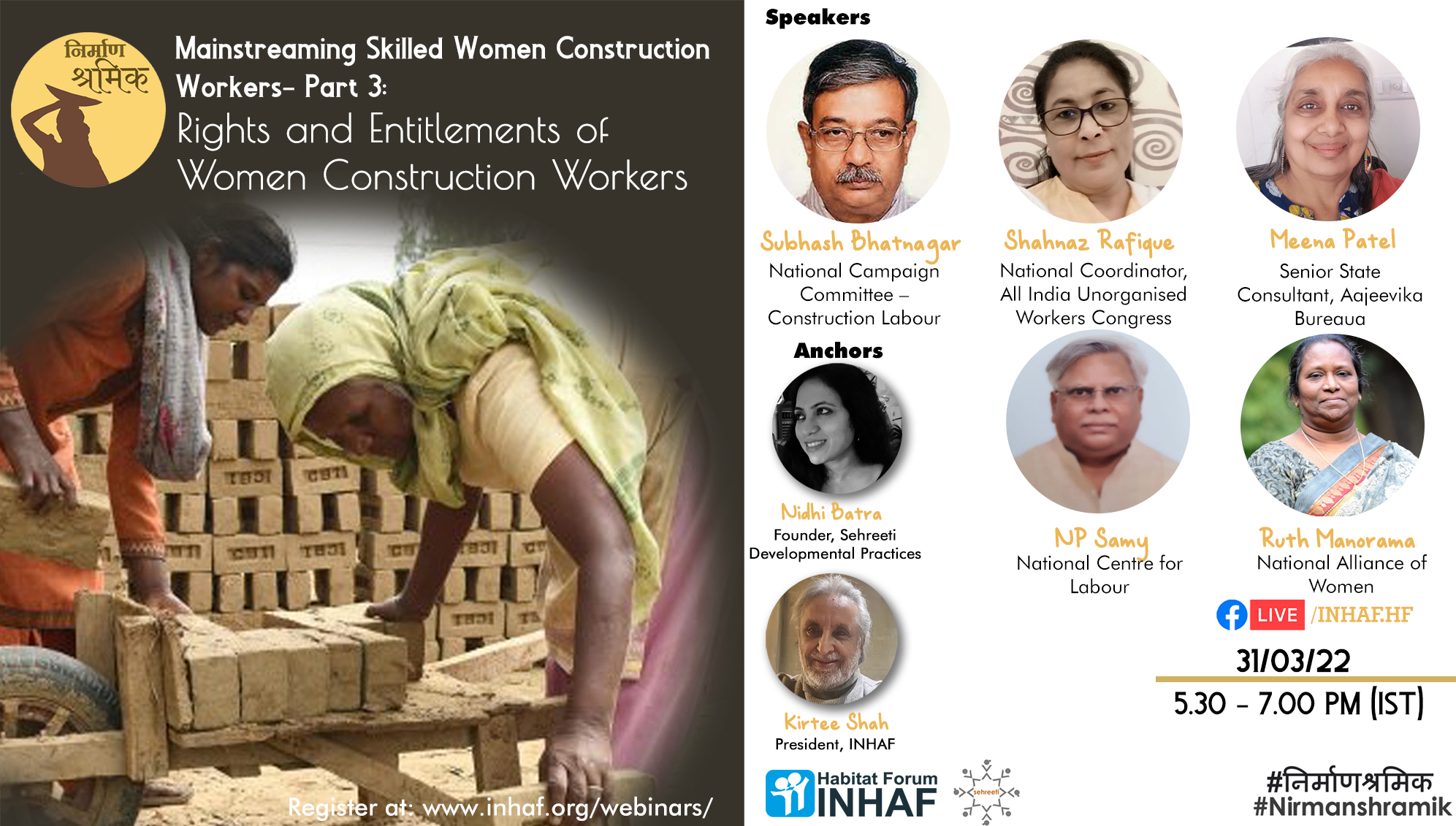
Local Time
- Timezone: America/New_York
- Date: Mar 31 2022
Mainstreaming Skilled Women Construction Workers- Part 3: Rights and Entitlements of Women Construction Workers
The sweeping reforms to labour laws introduced on 26th November 2020, has been described by many as a logical extension of three decades of neo-liberal hegemony that has sought to extend the hands of capital and dilute welfare responsibilities. With 44 central labour laws being consolidated into 4 labour codes, it is vital to review what this changed legal landscape means for construction workers and especially women, informal and migrant workers among them.
It is well acknowledged that labour laws in the country have been built around the assumption of a ‘standard employment relationship’, leaving out of its ambit informal workers who constitute more than 90% of the total workforce. Furthermore, labour laws are built around a gendered conception of labour, which discounts the unpaid care work that women carry out in families and communities. While certain landmark laws such as Building and Other Construction Workers Act and Unorganized Workers Social Security Act, anchored labour rights on their identities as workers rather than as employees, the implementation of these laws has been dismal. The labour reform process presented a singular opportunity to address these limitations. However, critiques have raised the concern that under the garb of uniformity and simplicity, these new labor laws have diluted the hard won labor rights of existing laws.
While looking at the implication of the new labour laws, it is essential to look deeper at how the existing institutional machinery has served the interest of workers in sectors like construction, which are marked by a high degree of casualization and informalization of labor. Collectivization of workers in the construction industry has been curtailed by the temporary and shifting nature of work arrangements. Women are further excluded from representation in trade unions and worker collectives. Vital challenges such as ensuring portability of rights and entitlements for migrant workers, reporting and penalizing non-compliance of labour regulations, clarifying employer responsibilities and liabilities are challenges that remain. It is also necessary to look at the performance of central and state level social security schemes for housing, health and maternity benefits, life and disability cover for unorganized workers.
This webinar will discuss the implications of the new labor reforms for women, informal and migrant workers in the construction industry. It shall also embark on a wider discussion on the rights, entitlements and welfare framework for informal and migrant workers and enquire how their rights as citizens and workers can be foregrounded.
The sweeping reforms to labour laws introduced on 26th November 2020, has been described by many as a logical extension of three decades of neo-liberal hegemony that has sought to extend the hands of capital and dilute welfare responsibilities. With 44 central labour laws being consolidated into 4 labour codes, it is vital to review what this changed legal landscape means for construction workers and especially women, informal and migrant workers among them.
It is well acknowledged that labour laws in the country have been built around the assumption of a ‘standard employment relationship’, leaving out of its ambit informal workers who constitute more than 90% of the total workforce. Furthermore, labour laws are built around a gendered conception of labour, which discounts the unpaid care work that women carry out in families and communities. While certain landmark laws such as Building and Other Construction Workers Act and Unorganized Workers Social Security Act, anchored labour rights on their identities as workers rather than as employees, the implementation of these laws has been dismal. The labour reform process presented a singular opportunity to address these limitations. However, critiques have raised the concern that under the garb of uniformity and simplicity, these new labor laws have diluted the hard won labor rights of existing laws.
While looking at the implication of the new labour laws, it is essential to look deeper at how the existing institutional machinery has served the interest of workers in sectors like construction, which are marked by a high degree of casualization and informalization of labor. Collectivization of workers in the construction industry has been curtailed by the temporary and shifting nature of work arrangements. Women are further excluded from representation in trade unions and worker collectives. Vital challenges such as ensuring portability of rights and entitlements for migrant workers, reporting and penalizing non-compliance of labour regulations, clarifying employer responsibilities and liabilities are challenges that remain. It is also necessary to look at the performance of central and state level social security schemes for housing, health and maternity benefits, life and disability cover for unorganized workers.
This webinar will discuss the implications of the new labor reforms for women, informal and migrant workers in the construction industry. It shall also embark on a wider discussion on the rights, entitlements and welfare framework for informal and migrant workers and enquire how their rights as citizens and workers can be foregrounded.
